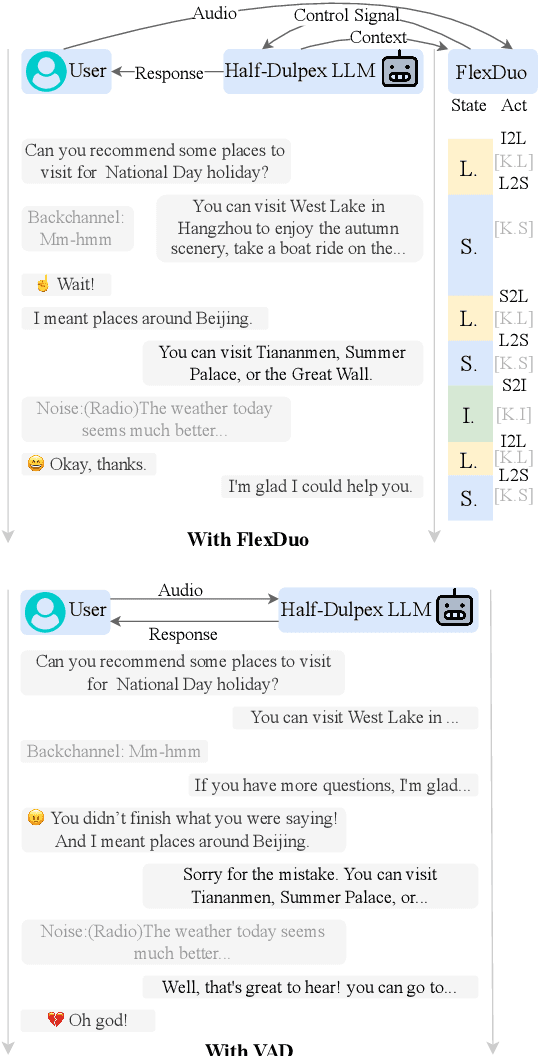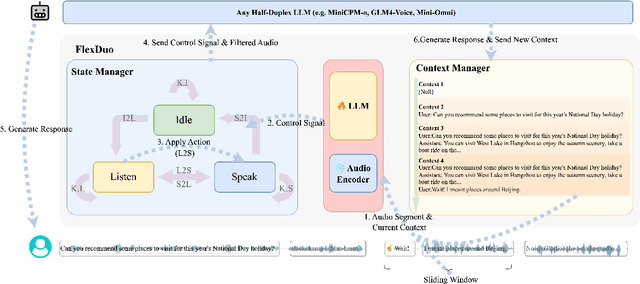Yulong Xu
Kling-Omni Technical Report
Dec 18, 2025



Abstract:We present Kling-Omni, a generalist generative framework designed to synthesize high-fidelity videos directly from multimodal visual language inputs. Adopting an end-to-end perspective, Kling-Omni bridges the functional separation among diverse video generation, editing, and intelligent reasoning tasks, integrating them into a holistic system. Unlike disjointed pipeline approaches, Kling-Omni supports a diverse range of user inputs, including text instructions, reference images, and video contexts, processing them into a unified multimodal representation to deliver cinematic-quality and highly-intelligent video content creation. To support these capabilities, we constructed a comprehensive data system that serves as the foundation for multimodal video creation. The framework is further empowered by efficient large-scale pre-training strategies and infrastructure optimizations for inference. Comprehensive evaluations reveal that Kling-Omni demonstrates exceptional capabilities in in-context generation, reasoning-based editing, and multimodal instruction following. Moving beyond a content creation tool, we believe Kling-Omni is a pivotal advancement toward multimodal world simulators capable of perceiving, reasoning, generating and interacting with the dynamic and complex worlds.
ViRefSAM: Visual Reference-Guided Segment Anything Model for Remote Sensing Segmentation
Jul 03, 2025Abstract:The Segment Anything Model (SAM), with its prompt-driven paradigm, exhibits strong generalization in generic segmentation tasks. However, applying SAM to remote sensing (RS) images still faces two major challenges. First, manually constructing precise prompts for each image (e.g., points or boxes) is labor-intensive and inefficient, especially in RS scenarios with dense small objects or spatially fragmented distributions. Second, SAM lacks domain adaptability, as it is pre-trained primarily on natural images and struggles to capture RS-specific semantics and spatial characteristics, especially when segmenting novel or unseen classes. To address these issues, inspired by few-shot learning, we propose ViRefSAM, a novel framework that guides SAM utilizing only a few annotated reference images that contain class-specific objects. Without requiring manual prompts, ViRefSAM enables automatic segmentation of class-consistent objects across RS images. Specifically, ViRefSAM introduces two key components while keeping SAM's original architecture intact: (1) a Visual Contextual Prompt Encoder that extracts class-specific semantic clues from reference images and generates object-aware prompts via contextual interaction with target images; and (2) a Dynamic Target Alignment Adapter, integrated into SAM's image encoder, which mitigates the domain gap by injecting class-specific semantics into target image features, enabling SAM to dynamically focus on task-relevant regions. Extensive experiments on three few-shot segmentation benchmarks, including iSAID-5$^i$, LoveDA-2$^i$, and COCO-20$^i$, demonstrate that ViRefSAM enables accurate and automatic segmentation of unseen classes by leveraging only a few reference images and consistently outperforms existing few-shot segmentation methods across diverse datasets.
FlexDuo: A Pluggable System for Enabling Full-Duplex Capabilities in Speech Dialogue Systems
Feb 19, 2025



Abstract:Full-Duplex Speech Dialogue Systems (Full-Duplex SDS) have significantly enhanced the naturalness of human-machine interaction by enabling real-time bidirectional communication. However, existing approaches face challenges such as difficulties in independent module optimization and contextual noise interference due to highly coupled architectural designs and oversimplified binary state modeling. This paper proposes FlexDuo, a flexible full-duplex control module that decouples duplex control from spoken dialogue systems through a plug-and-play architectural design. Furthermore, inspired by human information-filtering mechanisms in conversations, we introduce an explicit Idle state. On one hand, the Idle state filters redundant noise and irrelevant audio to enhance dialogue quality. On the other hand, it establishes a semantic integrity-based buffering mechanism, reducing the risk of mutual interruptions while ensuring accurate response transitions. Experimental results on the Fisher corpus demonstrate that FlexDuo reduces the false interruption rate by 24.9% and improves response accuracy by 7.6% compared to integrated full-duplex dialogue system baselines. It also outperforms voice activity detection (VAD) controlled baseline systems in both Chinese and English dialogue quality. The proposed modular architecture and state-based dialogue model provide a novel technical pathway for building flexible and efficient duplex dialogue systems.
TCM-FTP: Fine-Tuning Large Language Models for Herbal Prescription Prediction
Jul 15, 2024



Abstract:Traditional Chinese medicine (TCM) relies on specific combinations of herbs in prescriptions to treat symptoms and signs, a practice that spans thousands of years. Predicting TCM prescriptions presents a fascinating technical challenge with practical implications. However, this task faces limitations due to the scarcity of high-quality clinical datasets and the intricate relationship between symptoms and herbs. To address these issues, we introduce DigestDS, a new dataset containing practical medical records from experienced experts in digestive system diseases. We also propose a method, TCM-FTP (TCM Fine-Tuning Pre-trained), to leverage pre-trained large language models (LLMs) through supervised fine-tuning on DigestDS. Additionally, we enhance computational efficiency using a low-rank adaptation technique. TCM-FTP also incorporates data augmentation by permuting herbs within prescriptions, capitalizing on their order-agnostic properties. Impressively, TCM-FTP achieves an F1-score of 0.8031, surpassing previous methods significantly. Furthermore, it demonstrates remarkable accuracy in dosage prediction, achieving a normalized mean square error of 0.0604. In contrast, LLMs without fine-tuning perform poorly. Although LLMs have shown capabilities on a wide range of tasks, this work illustrates the importance of fine-tuning for TCM prescription prediction, and we have proposed an effective way to do that.
 Add to Chrome
Add to Chrome Add to Firefox
Add to Firefox Add to Edge
Add to Edge